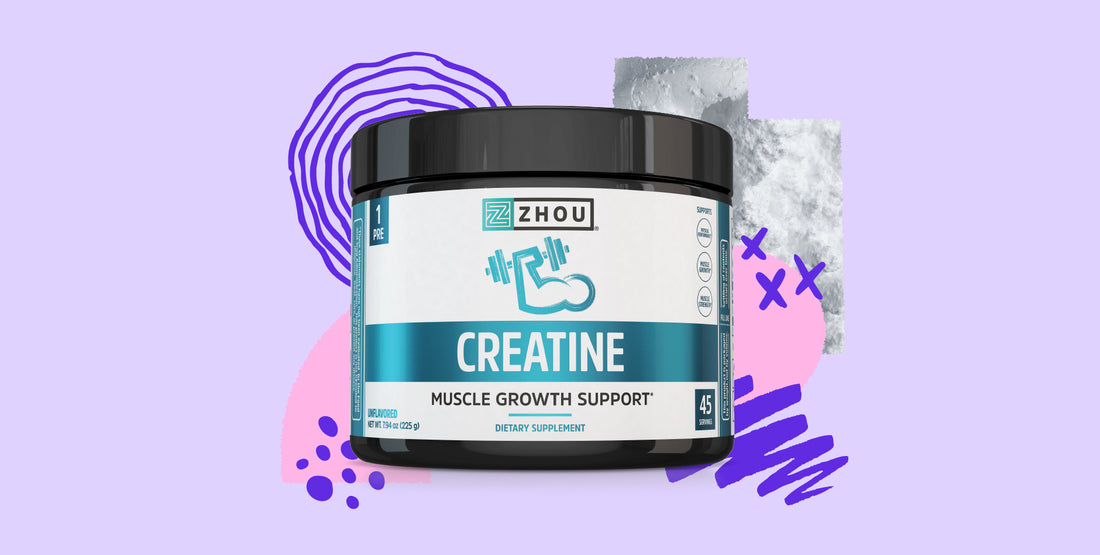Creatine is most often considered the amino acid that supports muscles but there is so much more to the story. It’s true that creatine helps provide a steady supply of energy to muscles to help support muscle growth and strength and physical performance.1
That’s why creatine is a very popular supplement used by elite athletes and bodybuilders because it helps support muscle energy, especially during high-intensity workouts. In addition to supporting overall physical performance, research shows that creatine supports muscles before, during, and after workouts and helps support muscle recovery.2
What Else Can Creatine Powder Help Support?
While about 95% of creatine in the human body is found in muscle tissue, there is a small amount of creatine also found in the brain.1 That explains, in part, why creatine supplementation may also help support brain function. A 2023 review of 10 different studies found that creatine supplements had supported memory performance in healthy individuals, especially those aged 66 to 76.3 Previous research showed that creatine supplementation had helped support working memory in young adults that were tested.4
Research also shows that many people do not get enough creatine to support general wellness so it may also have benefits beyond performance, muscle strength, and the brain most notably with heart health and healthy aging. 5
Because the main dietary source of creatine is meat, vegetarians may benefit from supplemental creatine as well.6
How to Use Creatine Powder
The easiest way to add creatine to your daily routine is to mix pure creatine powder into water, juice, shakes, or smoothies. To get the purest form of creatine, choose a product that is unflavored, vegan, gluten-free, non-GMO, and made without soy. Just one scoop a day is all you need to get the health benefits of creatine. If you are using creatine to get the most out of your exercise routine, take it before, during, or after your workout. Creatine helps support muscle energy so you get the most out of your workout.
Looking for more ways to support a successful workout? Find out what to do when you’re too tired to work out. And don’t forget to follow @zhou_nutrition for more fitness and wellness tips!
References
- Kreider RB, Kalman DS, Antonio J, et al. International Society of Sports Nutrition position stand: safety and efficacy of creatine supplementation in exercise, sport, and medicine. J Int Soc Sports Nutr. 2017;14:18. https://www.ncbi.nlm.nih.gov/pmc/articles/PMC5469049/?report=reader
- Wax B, Kerksick CM, Jagim AR, et al. Creatine for exercise and sports performance, with recovery considerations in healthy populations. Nutrients. 2021;13(6). https://www.mdpi.com/2072-6643/13/6/1915
- Prokopidis K, Giannos P, Triantafyllidis KK, et al. Effects of creatine supplementation on memory in healthy individuals: a systematic review and meta-analysis of randomized controlled trials. Nutrition Reviews. 2023;81(4):416-427. https://academic.oup.com/nutritionreviews/article/81/4/416/6671817
- Rae C, Digney AL, McEwan SR, Bates T. Oral creatine monohydrate supplementation improves brain performance: a double-blind, placebo-controlled, cross-over trial. Proc Biol Sci. 2003;270(1529):2147-2150. https://www.ncbi.nlm.nih.gov/pmc/articles/PMC1691485/
- Ostojic SM. Creatine as a food supplement for the general population. Journal of Functional Foods. 2021;83. https://www.sciencedirect.com/science/article/pii/S1756464621002176
- Kaviani M, Shaw K, Chilibeck PD. Benefits of Creatine Supplementation for Vegetarians Compared to Omnivorous Athletes: A Systematic Review. Int J Environ Res Public Health. 2020;17(9):3041. https://www.ncbi.nlm.nih.gov/pmc/articles/PMC7246861/?report=reader



